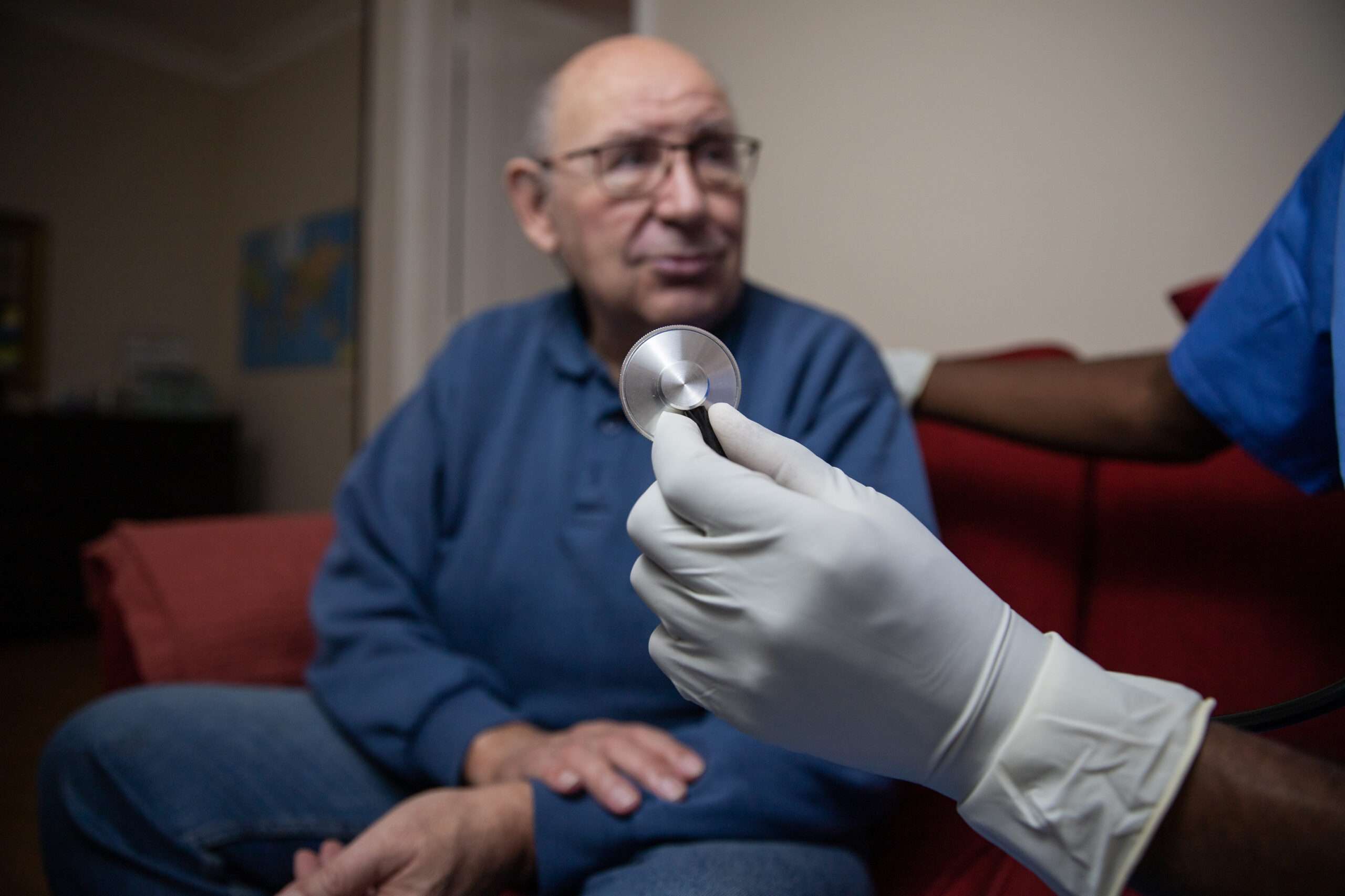As the healthcare industry faces increasing regulatory changes, margin pressures, and rising costs, companies like CVS Health and Humana are feeling the squeeze. Experts emphasize the need for value optimization, with low-cost care settings showing the most potential for success. Inbound Health and Allina Health are leading the way with their innovative Elevated Care at Home (ECH) program. Developed in response to the COVID-19 pandemic, ECH offers an alternative to traditional hospital stays and post-acute care services, improving outcomes while addressing capacity and cost challenges. Together, Inbound Health and Allina Health are transforming transitional care to enhance both quality and affordability.
-
Improving Patient Outcomes with Acute Hospital Care at Home

Preliminary Analysis of Hospital Care at Home Performance Outcomes
This preliminary analysis examines performance outcomes in patients discharged to Inbound Health’s Hospital Care at Home program, which meets CMS Acute Hospital Care at Home requirements, within a Minneapolis-based health system.
Patients in Inbound’s program had a lower 30 day readmission rate compared to matched patients based on severity of illness. Also, the mean length of inpatient stay was shorter with the Inbound Health cohort of patients.
We improved care and created greater efficiency for our patients, families, and healthcare systems.
-
Maximize the 90 Day Acute Hospital Care at Home Extension

The 90-day extension of the Acute Hospital Care at Home (AHCAH) waiver provides hospitals with continued flexibility from the Centers for Medicare and Medicaid Services (CMS), allowing them to deliver certain types of acute care in patients’ homes rather than requiring admission to a traditional inpatient facility.
Originally introduced during the COVID-19 public health emergency (PHE), the AHCAH waiver was designed to help hospitals manage patient surges more effectively, utilizing telehealth and home-based care solutions. Under the waiver, hospitals can treat eligible patients at home with appropriate medical oversight, including remote monitoring and necessary therapeutic interventions, thereby extending hospital-level care beyond the traditional setting.
Key Implications of the 90-Day Extension for Health Systems
Continued Flexibility for Hospitals:
The 90-day extension provides health systems with additional time to integrate home-based care into their operational strategies. This enables hospitals to treat patients who require acute care but do not need full hospitalization, optimizing the use of hospital resources.
The extension also offers hospitals greater flexibility in managing patient volume and capacity, helping to prevent strain on physical facilities—particularly in the face of potential patient surges.
Financial Impact:
Reimbursement and funding: The waiver enables hospitals to receive reimbursement for acute care provided at home, as though the care were delivered in an inpatient setting. These reimbursement rates may be subject to adjustment or extension as policies evolve.
Hospitals can continue billing Medicare for home-based acute care services, which represents a critical revenue stream. If this flexibility is extended or made permanent beyond the 90-day period, it could offer significant financial relief, particularly for hospitals in rural or underserved areas facing resource constraints.
Operational Adjustments:
Health systems may need to invest in infrastructure like telehealth systems, remote patient monitoring technologies, and home health nurse services to comply with the AHCAH requirements.
For hospitals not already equipped for home-based acute care, the extension provides an opportunity to ramp up resources or partner with home health solution providers.
Patient-Centered Care:
The extension allows hospitals to continue to offer patient-centered care by providing more comfortable care options for patients who are appropriate for home care, reducing the risk of hospital-acquired infections and improving patient satisfaction.
Quality of Care and Regulatory Compliance:
Hospitals will need to continue ensuring that the care provided at home meets the necessary clinical standards. Compliance with all applicable regulations and quality of care measures will be crucial to maintain eligibility for reimbursement.
Monitoring and quality assurance processes will remain key, as patients receiving care at home will still require oversight by healthcare providers to ensure their safety and well-being.
Strategic Planning:
Health systems might use the 90-day extension to evaluate the feasibility of incorporating hospital-at-home models into their long-term strategies. For some systems, the waiver could help them test these models on a larger scale to understand the financial, operational, and clinical implications before committing to more permanent changes.
Next Steps
The 90-day extension of the AHCAH waiver provides health systems with a unique opportunity to expand and refine their home-based care services. Inbound Health can be a key partner in this process by offering a comprehensive, scalable solution for delivering acute hospital-level care at home, ensuring regulatory compliance, improving patient outcomes, and optimizing operational efficiency. Our expertise in hospital-at-home care helps health systems confidently navigate this new care model and maximize the benefits of the waiver extension.
Discover what healthcare systems can do during this 90-day period, key insights from Washington officials and staff, and how Inbound Health can support your health system.
Read and download the details below.
-
How CMS and Private Payers Are Adapting to Hospital Care at Home

Hospital-Care-at-Home (HCAH) saw federal implementation in response to the COVID-19 pandemic and has since gained significant momentum in large part because of the numerous benefits seen by healthcare facilities, professionals, and patients alike.
In recent years, an increasing emphasis has been placed on cost-effective healthcare that is also patient-centric, lowering care costs while maintaining (or even improving) the quality of care given and the outcomes received. As technology continues to advance, telemedicine has also seen greater implementation, leading to a greater capacity for providing hospital-quality care at home.
Both the Centers for Medicare & Medicaid Services (CMS) and private payers have adapted to the evolving healthcare landscape and growing demand for home-based care, whether it’s to improve care, lower costs, or make healthcare more efficient, lowering the backlog of cases that drive down hospital care quality.
CMS: The Catalyst of Federal Hospital-At-Home Initiatives
In November 2020, in response to the COVID-19 pandemic, CMS launched the Acute Hospital Care at Home (AHCAH) initiative, which allows certain hospitals that are Medicare-certified to treat their patients at home with care that resembles inpatient-level quality. With this initiative, CMS made it possible for Medicare patients to receive care at home when they meet certain criteria, opening up hospital beds for those who need inpatient care.
One way in which CMS has adapted to hospital care at home is through the establishment of the AHCAH waiver, which has some key changes to Medicare rules, such as:
Location flexibility – Hospitals may provide acute inpatient services in a patient’s home rather than a traditional inpatient setting.
Eligibility criteria – There are specific criteria that patients must meet in order to be eligible for HCAH, including their home environment (it must be safe and stable), clinical needs, and logistical support. The purpose of CMS’s criteria is to ensure that patients who are recommended for HCAH have the greatest likelihood of seeing its benefits, similar to how certain drugs are only FDA-approved for specific patient populations.
Telemedicine integration – Through the waiver, CMS allows for remote monitoring, telemedicine, and other digital health tools to be used in order to constantly survey patients and communicate with their care teams.
Through these adaptations in CMS rules, hospitals that offer HCAH remain eligible for Medicare reimbursement.
The HCAH initiative saw such great success that in 2023, through the Consolidated Appropriations Act, the waivers and flexibilities outlined above were extended through the end of 2024. Congress is expected to vote on whether to extend the HCAH initiative beyond 2024 in the next few days. Not only does this continue to allow hospitals to offer care at home for their patients, but it also shows CMS’s commitment to integrating hospital care at home into the broader healthcare system. It also allows hospitals to apply for hospital care at home on an ongoing basis rather than only in emergencies.
Finally, CMS has adjusted its payment structure in order to continue supporting hospital care at home. Through their new payment structure, hospitals are reimbursed similarly to traditional inpatient stays.
For HCAH services, CMS uses a bundled payment model wherein hospitals receive a single payment for the entire episode of care, which covers all services that are delivered to the patient at home based on the reimbursement amount for in-person care. The payment model also adjusts for the level of care required and the duration of the home care episode, which is designed to align financial incentives with cost efficiency and improved patient outcomes.
The CMS AHCAH program shifted home care from an experimental hope to a strategic priority, and their adaptations have made it possible for hospitals across the country to initiate and expand their hospital-at-home programs.
How Private Payers Are Joining In
Private payers often align their adjustments with the Centers for Medicare and Medicaid Services, typically by implementing policy changes that gradually resemble CMS’s policies.
As more and more providers see the benefits of hospital care at home, there is a shift toward greater funding and implementation. Some payers have goals to move more of their medical patients to home care, with research continually pointing out care services that can see the shift to at-home care.
In the past, many private payers did not pay for care at home or telemedicine services, both key elements of hospital care at home. However, payers are accepting the shift of the healthcare market and expanding their coverage to these key areas, making hospital care at home possible.
When it comes to private payers, one of the greatest challenges in implementing a program of this scale and investing in it properly is ensuring that there will be enough of a need to make the investment worthwhile. Payers are adapting to this challenge by using greater sources of data to drive their advancements. Specifically, data allows payers to understand the patient population of their network or hospital and determine if enough patients with conditions that may be treated at home are admitted. Furthermore, this data allows payers to find an in-demand need to focus on first, helping them to prioritize the new technologies, processes, and additional specialized personnel that are needed to offer treatment for one specific service line at home.
The upfront cost of implementing hospital care at home remains a challenge for private payers, but to further mitigate the financial risks, some health systems may choose to partner with third parties. Some healthcare firms are building hospital-at-home programs as standalone services that are then marketed to hospitals, physicians, and insurers. For institutions that do not have the means to implement their own program, the third-party option is an adaptation that makes hospital care at home possible for their patients.
Thanks to the implementation and benefits analysis of the AHCAH initiative completed by CMS, private payers are able to see how they can also benefit from embracing hospital-at-home, prompting them to jump on the bandwagon. Challenges still exist for many payers, but they are learning to adapt in order to implement healthcare’s most promising care innovation.
Adapting to Hospital Care at Home
The beauty of the healthcare field is that it is eternally evolving—yesterday’s challenges soon become obsolete thanks to tomorrow’s advancements. However, the key to making the most of these advancements is for healthcare facilities and institutions to evolve and adapt, as well, which CMS and private payers are actively working on with hospital care at home.
Hospital-at-Home is one of the most evidence-based healthcare delivery innovations of the past few decades, which is why we are seeing so many adaptations to make the most of this advancement. With each step forward, hospitals improve their care quality, and health systems lower the cost needed to provide exceptional care.
For those looking to jump on board, Inbound Health helps providers build and operate hospital-at-home programs and helps payers develop payment models with health systems. If you’re unsure how to adapt to HCAH, Inbound Health can help.
References
Acute Hospital Care at Home Data Release Fact Sheet | CMS. (2024). Cms.gov. https://www.cms.gov/newsroom/fact-sheets/acute-hospital-care-home-data-release-fact-sheet
-
Advanced Care-at-Home Programs Drive Value for Heart Failure Patients

Authors: Mary Oberst MSC, Camilla Dziura MHA, Seth Glickman, M.D., MBA,
Rachel Rivard, M.D., Kimberly Hedger, Emily Downing, M.D.
Preventable heart failure readmissions pose a significant financial challenge to hospitals and health systems. Reducing 30-day heart failure readmissions optimizes reimbursement for hospitals that participate in CMS value-based programs, such as the Hospital Readmissions Reduction Program (HRRP), which incentivizes processes of care that decrease preventable events and thereby reduce overall readmission rates.
Advanced care-at-home programs that serve as alternatives to extended hospitalization and institutional post- acute care offer an innovative and effective solution for hospitals seeking to optimize patient outcomes and reduce avoidable readmissions, resulting in substantial financial gains.
In implementing Inbound Health’s novel in-home care model that supports early hospital discharge and provides an alternative to institutional post-acute care, Allina Health was able to reduce 30-day readmissions in their heart failure population by 30% over a 2.8-year period, generating significant cost- savings for the health system.
-
Acute and Post-Acute Care at Home Programs Contribute to Shorter Hospital Length of Stay

1 less day in the hospital
Average traditional hospital stay: 7.4 days
Average discharge to acute or post-acute care at-home programs: 6.4 days
A study by Inbound Health analyzed the length of stay (LOS) for patients discharged to one of their acute or post-acute care-at-home programs, comparing it to those who remained in the hospital for all their acute care needs. The goal was to determine if receiving advanced care at home results in a shorter hospital stay compared to patients who did not have alternative care options.
Researchers reviewed a substantial dataset comprising 10,519 care episodes over three years, from 2021 to 2023. This extensive review allowed for a detailed examination of patient outcomes, length of stay, costs, and other key metrics associated with both care models.
The research comparing hospital length of stay (LOS) for patients discharged to Inbound Health’s acute and post-acute care-at-home programs versus those who completed their acute care in the hospital shows an average reduction of one day for those receiving home-based care. For treatment of sepsis, respiratory failure, and kidney and urinary tract infections, the reduction in LOS ranged from one to two days.
The increase in throughput has multiple benefits for health systems. It allows hospitals to handle more patients within existing infrastructure and resources, effectively increasing their overall capacity to deliver healthcare services. The shorter LOS also reduces the cost of care for healthcare providers and payers.
Researchers concluded there were several factors that shortened the hospital LOS for patients who were discharged to Inbound Health’s care at home programs:
Focused Care Delivery: Inbound Health’s program typically has a narrower focus on recovery compared to traditional healthcare facilities, which may also provide long-term care services. This focused approach allows for more efficient and goal-oriented care delivery, helping patients achieve their recovery goals sooner and facilitating timely discharge from the hospital.
Streamlined Admission Process: With Inbound Health’s program, there is a streamlined admission process, enabling patients to transition quickly from the hospital to home-based care. This reduces administrative delays and logistical challenges associated with facility-based admissions, allowing patients to ultimately spend fewer days in the hospital.
Close Monitoring and Supervision: Patients in Inbound Health’s program receive close monitoring and supervision from skilled healthcare professionals, including nurses, therapists, and physicians. This intensive oversight helps detect and address any complications or barriers to recovery promptly, optimizing the recovery process and minimizing hospital stays.
Enhanced Care Coordination: The program prioritizes care coordination between hospital teams and at home providers, ensuring seamless transitions and continuity of care. This collaborative approach facilitates discharge planning and post-discharge support, reducing the likelihood of hospital readmissions and enabling patients to leave the hospital sooner.
Inbound Health’s care at home programs provide a thorough and patient-centered approach to care, emphasizing both individualized attention and efficient delivery. By addressing the unique needs of patients moving from hospital to home, this program accelerates recovery, enhances outcomes, and reduces the length of hospital stays.

